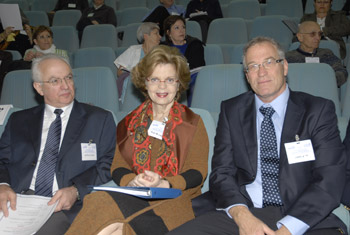Male fetuses are more trouble

Pictured from R to L: Dr Eyran Halpern, CEO, RMC, Prof. M. Legato, Editor-in Chief of Gender Medicine, Columbia University, New York, Prof. Marek Glezerman, Head, Helen Schneider Hospital for Women, RMC
Judy Siegel-Itzkovich, THE JERUSALEM POST
It isn't an "old wives' tale" that carrying a male fetus is more "troublesome" than carrying a female fetus, according to research encompassing over 66,000 women who gave birth at the Rabin Medical Center (RMC) in Petah Tikva between 1995 and 2006.
Prof. Marek Glezerman, Dr. Yariv Yogev and Dr. Nir Melamed of the medical center's Helen Schneider Hospital for Women and Tel Aviv University's Sackler Faculty of Medicine found in the retrospective study that a fetus being a male "is an independent risk factor" for preterm delivery, preterm rupture of membranes, delivery by vacuum and forceps or cesarean section; at the same time, female fetuses are at increased risk for breech presentation (legs first) and intrauterine growth restriction.
The study will be presented at the founding conference of the Israel Society for Gender Medicine, which will be held at Rabin Medical Center at the end of this month. Over 34,000 (51.8 percent) delivered boys and 32,000 (48.2%) delivered girls. The demographic and obstetric characteristics of the women with a male fetus and those with a female fetus were similar.
The rate of pre-term delivery (as early as 29 weeks) was higher for male fetuses and was attributed to an increased incidence of spontaneous preterm labor and preterm, premature rupture of membranes. Women carrying male fetuses were at increased risk for operative vaginal delivery, gestational diabetes, abnormal fetal heart rate and failed vaginal delivery and cesarean delivery. Female fetuses were more likely to experience restricted fetal growth, while males were at increased risk for being too big.
The doctors admitted that they did not have a clear understanding of the mechanisms by which fetal gender interacts with pregnancy outcome. But they said the broad and long-term study could help in the future to understand the mechanisms involved in premature birth and factors that influence fetal growth in the uterus.
Glezerman, who heads the Helen Schneider Women's Hospital, said the study of early differences between the sexes shows that medicine should regard males and females as different in their characteristics. "Further investigation of the mechanisms responsible for this association may contribute to our understanding of the pathophysiology of pregnancy complications such as preterm delivery and fetal growth.
Related Articles
New Yorkers Hear War Report
In the middle of August during the Israel-Lebanon war, Stephen
and Yvette Cohen Pomerantz hosted an event at their New
York City home with Dr. Dean Ad-El, Director of Plastic Surgery
at Rabin Medical Center.
Paintings for Patients
Menashe Kadishman has donated 18 of his magnificent works of art to the opening of the Institute of Pulmonary Medicine at Rabin Medical Center.
Israeli Hospitals Destroy Tumors With Liquid Nitrogen
IceCure Medical, an Israeli company developing a minimally invasive medical device for treating tumors, announced that it will start offering its technology in Israel in upcoming weeks.